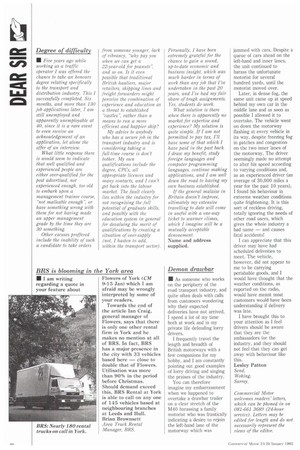Degree of difficulty
Page 42

If you've noticed an error in this article please click here to report it so we can fix it.
• Five years ago while working as a traffic operator I was offered the chance to take an honours degree relating specifically to the transport and distribution industry. This I successfully completed. Six months, and more than 130 job applications later, I am still unemployed and apparently unemployable at 40, since it is a rare event to even receive an acknowledgement of an application, let alone the offer of an interview.
What little response there is would seem to indicate that well qualified and experienced people are either overqualified for the post advertised, not experienced enough, too old to embark upon a management trainee course, "not malleable enough", or have something wrong with them for not having made an upper management grade by the time they are 30 something.
Other excuses proffered include the inability of such a candidate to take orders from someone younger, lack of vibrancy, "why pay you when we can get a 22-year-old for peanuts'', and so on. Is it even possible that traditional British hauliers, major retailers, shipping lines and freight forwarders might perceive the combination of experience and education as a threat to established "castles", rather than a means to run a more efficient and happier ship?
My advice to anybody who has a secure job in the transport industry and is considering taking a full-time course is don't bother. My own qualifications include the degree, CPC's, all appropriate licences and many contacts, and I can't get back into the labour market. The fault clearly lies within the industry for not recognising the full potential of graduate skills, and possibly with the education system in general for devaluing the merit of qualifications by creating a situation of oversupply (not, I hasten to add, within the transport sector). Personally, I have been extremely gratefid for the chance to gain a sound, up-to-date economic and business insight, which was much harder in terms of work than any job that I've undertaken in the past 20 years, and I've had my fair share of tough assignments. Yes, students do work.
What solution is there when there is apparently no market for expertise and experience? My solution is quite simple. If I am not permitted to pay tax, I'll have some of that which I have paid in the past back. I draw my benefit, study foreign languages and computer programming languages, continue making applications, and I am well down the road to having my own business established.
If the general malaise in Britain doesn't improve, ultimately my extensive travelling to date will come in useful with a one-way ticket to warmer climes, which I imagine will be a mutually acceptable denouement.
Name and address supplied.
































































































































































